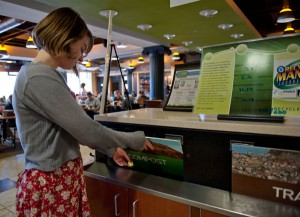Ithaca College’s compost initiative has continued to expand, matching the college’s commitment to be environmentally conscious.

This semester, Ithaca Dining Services is using Recyclemania, a recycling competition, to increase student consciousness and understanding of compost and food waste.
Stephanie Piech, sustainability coordinator for Sodexo, said
Dining Services is committed to a reduction of food waste and dining byproducts such as containers and utensils.
The Weigh the Waste campaign is one aspect of Sodexo’s commitment to sustainability. The event is designed to track the amount of waste students produce during a lunch or dinner period by asking students to dump whatever is left on their plates onto a scale.
Kat Lawton, a sustainability intern with Dining Services, stood in front of the dish return in Campus Center on Thursday, asking students to clear their plates onto the scale. She said student reaction was mixed. Some asked questions and thanked her for “being environmental” while others were reluctant.
“They have to scrape it into the bucket, and all of a sudden they become so weirded out by it,” she said. “If you’re comfortable putting that food in your body, then you should have no discomfort taking the food off the plate.”
The college’s composting program has grown since the March 2007 switch from an on-site operation to outsourcing to Cayuga Compost, a composting business in Trumansburg, N.Y. Mark Darling, sustainability programs coordinator for the college, said the switch is more sustainable because nutrients left in food scrap compost are getting back into food production rather than ornamental planting.
Before the change, compost was done on-campus using large machinery in a building near the Office of Public Safety on a smaller scale. Now, compost is collected every day and put in a specially outfitted truck, which then transports the organic waste three times a week to Cayuga Compost.
Darling said some compost bins are put in place by staff or faculty in buildings such as the Administration Annex and the Center for Natural Sciences, while others come with building upgrades.
“For all the renovation that we’ve done, compost has been included in your choice of materials management,” he said.
Darling also said he hopes to implement composting at the two apartment complexes on campus. However, the sites would have to be outdoors and unmonitored, so residents would need to be educated on composting and make a legitimate effort to follow through.
Piech said every year there is a new group of students to educate. She said some changes are being made to composting signs around campus, like in IC Square, so there is a more consistent message.
This will help students understand why they should compost and where their compost goes, Piech said. The goal is to make students aware of their food waste, educate them on how to manage their waste and encourage them to actually follow the different waste options.
“We’re going to do what we call a ‘can dump’ in retail to boost some of the education there,” she said. “We’re going to bust into the food court and take a trash bin, dump it on a tarp, and then sort things that should have been sorted.”







